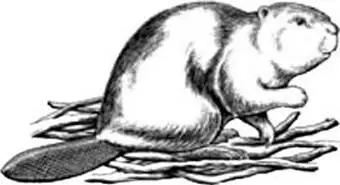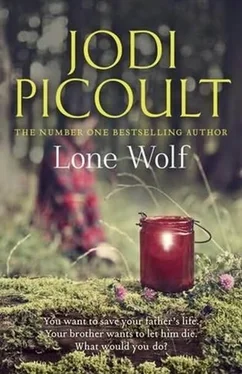The boys looked at each other. “Grandfather,” one said, “how do I make sure that it’s the good wolf who wins the fight?”
The old man looked from one boy to the other. “The wolf that will win the fight is the one you feed the most.”
After I lived with the wolves, I thought a lot about that comment. When you consume a carcass, there is a spot allotted for everyone. The alpha will tell you where to stand with ear postures, turning one ear flat and the other pinned back against the head, or rotating those ears like airplane wings to direct each member of the pack to the appropriate position. A junior member of the pack is still expected to defend what’s his, to growl and stand over his food. Dominance isn’t about taking away the food he deserves; it’s about being able to stand beside him, controlling the distance without taking any notice of his display of possessiveness.
An alpha could, of course, take any other pack member’s food. But why would she? She needs those junior members, and if she starves them to death, they become useless in protecting the family.
With all due respect to the Abenaki elder, when he was teaching those boys a lesson, I think he left out this small irony. The good wolf would never let that bad wolf starve. She may test his ability to defend his food, but for the sake of the pack, she’s going to make sure he survives.

When the judge calls for a two-hour lunch break so that he can eat and go to Mass, I am up and out of the courtroom like a shot, because I feel like I’m going to punch someone. After all, it’s not every day that you find out your father was screwing around on your mom and that your stepfather skewers you in public. I run blindly up the stairways of the courthouse, aware that I probably have an entourage at my heels, and rattle doorknobs until I find one that’s open.
Inside, I sit down on a conference table and draw my knees to my chest.
The worst part of it is that everything Joe said is true. My father wouldn’t be lying in a hospital bed if it weren’t for me. He never would have gone out on the roads that night. In some other, better world, he’s still looking after captive packs of wolves, with his cheerful, obedient daughter by his side.
The doorknob turns, and suddenly Edward is standing in front of me. “If you want to hide,” he says, “you have to lock the door. Take it from me.”
“You’re the last person I want to see right now.”
“Well, everyone’s looking for you. Mom thinks you’ve wigged out and run away again. Joe feels like crap, but he was just doing his job. And your lawyer… God, I don’t know. I guess she’s off making goat cheese or something.”
Against my will, a laugh bubbles out of me, carbonated emotion. “Don’t do that,” I say.
“Do what?”
“It’s easier when I can hate you,” I admit.
“You don’t hate me,” Edward says. “We’re on the same side, Cara. We both want to give Dad what he wants. We just each have a different idea of what that might be.”
“Why can’t you just wait a month or two? And then if nothing happens, you can still do what you want to do. But it doesn’t work the other way around. If you take him off life support now, we’ll never know if he could have gotten better.”
He hops up on the table next to me. “Nothing’s going to be different in a month,” Edward says.
I can think of so many things that will be different. I’ll be out of this sling. I’ll be back at school. Maybe I will even have gotten used to having Edward back here in Beresford.
I realize that we are having the conversation Edward didn’t have with me before he pulled the plug. So that’s changed, too.
I look up at him. “I’m sorry I got you arrested and put into jail.”
He grins. “No you’re not.”
I kick his foot, swinging next to mine. “Well. Maybe just a little.”
When I was tiny, the county fair came through town. Our parents took us, and got tickets for the rides, even though I was scared to death of all of them. Edward was the one who convinced me to go on the merry-go-round. He put me up on one of the wooden horses and he told me the horse was magic, and might turn real right underneath me, but only if I didn’t look down. So I didn’t. I stared out at the pinwheeling crowd and searched for him. Even when I started to get dizzy or thought I might throw up, the circle would come around again and there he was. After a while, I stopped thinking about the horse being magic, or even how terrified I was, and instead, I made a game out of finding Edward.
I think that’s what family feels like. A ride that takes you back to the same place over and over.
“Edward,” I ask. “Could you drive me somewhere?”
If my mother and Joe are surprised to hear that Edward is the one taking me to see my father, they hide it well. It is a fifteen-mile ride, but it feels much longer. This nondescript rental car isn’t Edward’s old beater and I am not hauling a backpack, but we’ve slipped seamlessly into the same spots we used to be in when Edward drove me to school as a kid. I fiddle around with the radio station until I find one of the French Canadian FM ones. Although Edward had taken six years of French in school, he used to mock-translate for me, making up outrageous news stories about live goldfish found in public drinking fountains and a pet donkey named Mr. LeFoux who was unwittingly elected to the town selectboard. I wait for him to start translating again, but he just frowns and turns on some classic rock.
When we get to the hospital, Edward pulls up right to the front. “Aren’t you coming in?” I ask.
He shakes his head. “I’ll come back later.”
It’s funny. All this time, when Edward was gone, I never felt like I was alone. But now that he’s back, as I watch him drive off, I feel lonely.
The nurses at the ICU desk all say hello to me, ask me how my shoulder feels. They tell me my dad has been a good patient, and I’m not sure if this is supposed to be some kind of joke, so I pretend to smile before I go into his room.
He is lying just the way he was the last time I visited, his arms tucked on top of the thin blanket, his head canted back on the pillow.
The pillows here suck. I know this from experience. They are too thick, and they are wrapped in plastic so your scalp sweats.
I walk toward my dad and gently reposition the pillow so it doesn’t set his neck at that weird angle. “Better, right?” I say, and I sit down on the foot of the bed.
Behind him is the weird techno-array of machines and computer monitors, like he is the star of a sci-fi movie. How cool would that be, I think. If he could communicate by making the little green lines jump on the screen. Twist and spell out the letters of my name.
For a moment, I watch just in case.
A nurse, an LPN, comes into the room. Her name is Rita, and she has a canary named Justin Bieber. She has a picture of the bird on her hospital ID tag. “Cara,” she says. “How are you doing today?” Then she pats my father on his shoulder. “And how’s my own personal Fabio?”
She calls him that because of his hair, or what’s left of it where it hasn’t been shaved. I guess the real Fabio is Mr. Romance Novel Cover, although I’ve never read one of those. I only know him as the guy who shilled I Can’t Believe It’s Not Butter!, and who got hit in the face by a bird on a Disney World ride.
While Rita hangs a new IV bag, I stare at my father’s hand on the blanket and try to imagine it touching a woman I cannot even picture in my memory anymore. I imagine him driving her to the clinic for her abortion. She would have been sitting in my seat.
Читать дальше













